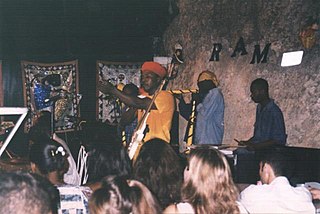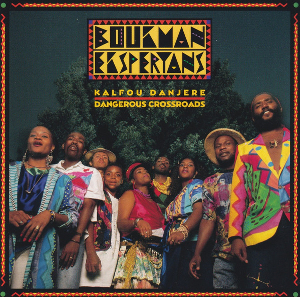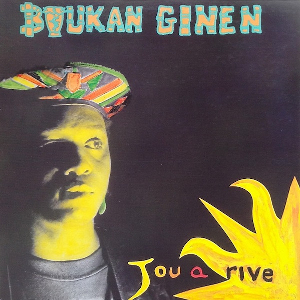The music of Haiti combines a wide range of influences drawn from the many people who have settled on this Caribbean island. It reflects French, African rhythms, Spanish elements and others who have inhabited the island of Hispaniola and minor native Taino influences. Styles of music unique to the nation of Haiti include music derived from rara parading music, twoubadou ballads, mini-jazz rock bands, rasin movement, hip hop Creòle, the wildly popular compas, and méringue as its basic rhythm. Haitian music is influenced mostly by European colonial ties and African migration. In the case of European colonization, musical influence has derived primarily from the French.
The culture of Haiti is a creolized blend of African, European and Taino elements due to the French colonization of Amerindian land, in conjunction with the large diverse enslaved African population whom had later freed themselves by a successful revolt. These attributions have largely influenced the art, cuisine, literature, music, religion as well as the languages of Haiti.

Boukman Eksperyans is a mizik rasin band from the city of Port-au-Prince, Haiti, Grammy nominated for their debut album Vodou Adjae. The band derives its name from Dutty Boukman, a vodou priest who led a religious ceremony in 1791 that is widely considered the start of the Haitian Revolution. The other half of the band's name, "Eksperyans", is the Haitian Creole word for "experience", and was inspired by the band's appreciation of the music of Jimi Hendrix. The band was at the height of its popularity in 1991 when the presidency of Jean Bertrand Aristide was overthrown in a military coup d'etat. Like many other artists and performers, Boukman Eksperyans fled the country to live in exile. During their time abroad, the band performed and spoke out against the military dictatorship of Raoul Cédras. In 1994, after Aristide was restored to power, the band returned to Haiti, where they continued to play concerts, record albums, and perform at the Carnival celebrations.
Dutty Boukman was an early leader of the Haitian Revolution. Born in Senegambia, he was enslaved to Jamaica. He eventually ended up in Haiti, where he became a leader of the Maroons and a vodou houngan (priest).
Compas, also known as compas direct in French, konpa dirèk in Haitian Creole, or simply konpa but most commonly as Kompa is a modern méringue dance music genre of Haiti. The genre was popularized by Nemours Jean-Baptiste following the creation of Ensemble Aux Callebasses in 1955, which became Ensemble Nemours Jean-Baptiste in 1957. The frequent tours of the many Haitian bands have cemented the style in all the Caribbean. Therefore, compas is the main music of several countries such as Dominica and the French Antilles. Whether it is called zouk, where French Antilles artists of Martinique and Guadeloupe have taken it, or konpa in places where Haitian artists have toured, this méringue style is influential in part of the Caribbean, Portugal, Cape Verde, France, part of Canada, South and North America.

Oungan is the term for a male priest in Haitian Vodou. The term is derived from Gbe languages. The word hounnongan means chief priest. ‘'Hounnongan or oungans are also known as makandals.
Bois Caïman was the site of the first major meeting of enslaved blacks during which the first major slave insurrection of the Haitian Revolution was planned.

RAM is a mizik rasin band based in the city of Port-au-Prince, Haiti. The band derives its name from the initials of its founder, songwriter, and lead male vocalist, Richard A. Morse. The band's music has been described by Morse as "Vodou rock 'n' roots", and has been one of the prominent bands in the mizik rasin musical movement in Haiti. RAM began performing together in 1990, and recorded their first album in 1996. The band's music incorporates traditional Vodou lyrics and instruments, such as rara horns and petro drums, into modern rock and roll. The band's songs include lyrics in Haitian Creole, French, and English.
Rasin, also known as Haitian roots music, is a musical style that began in Haiti in the 1970s when musicians began combining elements of traditional Haitian Vodou ceremonial and folkloric music with various musical styles. The late 20th century style of this music links to the roots of Vodou tradition, where it came to be known as mizik rasin later in Haitian Creole. Modern-day, the movement is often referred to simply as "rasin" or "racine".

Haitian Vodou is an African diasporic religion that developed in Haiti between the 16th and 19th centuries. It arose through a process of syncretism between several traditional religions of West and Central Africa and Roman Catholicism. There is no central authority in control of the religion and much diversity exists among practitioners, who are known as Vodouists, Vodouisants, or Serviteurs.
Richard Auguste Morse is a Puerto-Rican-born Haitian-American musician and hotel manager currently residing in Port-au-Prince, Haiti. Morse manages the Hotel Oloffson, and is the founder of a mizik rasin band, RAM, named after his initials. Morse is married to the band's lead female vocalist, Lunise Morse, and has two children. Morse and his band are famous in Haiti for their political songs and performances critical of the Raoul Cédras military junta from 1991 to 1994. In the early 2000s, Morse has also criticized Jean-Bertrand Aristide and Fanmi Lavalas through his music. Morse is a United States citizen. His cousin Michel Martelly is a musician, right-wing Haitian politician and former President of Haiti. Richard Morse repeatedly expressed support for Martelly in the 2010 presidential elections in Haiti. By the end of 2012, he had distanced himself from the Martelly government.
Vodou drumming and associated ceremonies are folk ritual faith system of henotheistic religion of Haitian Vodou originated and inextricable part of Haitian culture.
Misty Jean is a former Miss West Indies and singer. She sings in her native Haitian Creole / French language and also in English.
Haitian Carnival is a celebration held over several weeks each year leading up to Mardi Gras. Haitian Defile Kanaval is the Haitian Creole name of the main annual Mardi Gras carnival held in Port-au-Prince, Haiti.
Twoubadou music is a popular genre of guitar-based music from Haiti that has a long and important place in Haitian culture. The word comes from troubadour, a medieval poet-musician who wrote and sang songs about courtly love. Like the troubadours of old, the Haitian twoubadou is a singer-composer who accompanies himself on songs that tell about the bitterness and humor of love, often using risqué or suggestive lyrics.
Eddy François is a Haitian musician,
Jephté Guillaume is a Haitian-born DJ, bassist, multi-instrumentalist and vocalist from Brooklyn whose signature Haitian folk song-infused house music was signed and promoted by the New York-based Spiritual Life Music brand. His Tèt Kale sound combines acoustic grooves with electronica.

Kalfou Danjere is an album by the Haitian band Boukman Eksperyans, released in 1992. The title track, which translates to "Dangerous Crossroads", was banned in Haiti for its alleged subversive qualities. "Nwel Inosan" was also banned.

Jou a Rive is the debut album by the Haitian band Boukan Ginen, released in 1995. It was originally released in Haiti in 1993. Most of the lyrics were sung in Creole.






